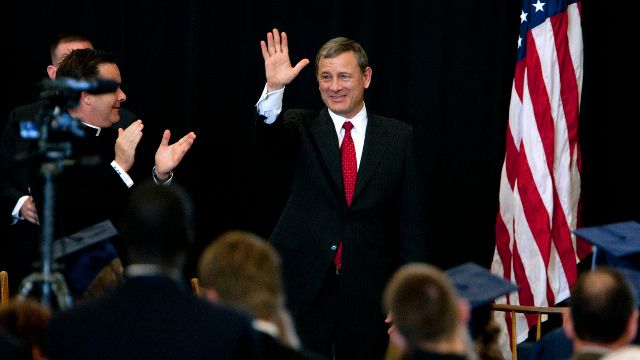
Supreme Court Chief Justice John Roberts waves after giving the commencement address on Friday, May 24, 2013, at LaLumiere School in LaPorte, Ind. (AP Photo/South Bend Tribune, James Brosher)
Chief Justice John Roberts has created the most conservative court in modern history: In just the last few weeks, his court has helped financial firms bilk pension funds, strengthened fossil fuel companies’ power to fast-track pipelines, limited the power of regulatory agencies that police Wall Street and stealthily let Donald Trump hide his tax returns. As a reward for Roberts’ continued defense of the wealthy and powerful, much of the national media has obediently depicted him as a great hero of moderation, because he sort of seemed to snub Trump in a handful of other rulings.
The press corps is willfully covering up the Roberts Court’s class war — and the cover up is happening even as the court’s latest salvo is now reverberating far away from the Washington political theater out here in the actual, real world.
Indeed, one of the Supreme Court’s least-noticed rulings in the few months just helped the planet’s most rapacious financial firms — and one of Donald Trump’s billionaire pals — stomp on thousands of public-sector workers and retirees in one of America’s poorest states. It also helped Wall Street avoid a full public examination of schemes that fleece investors. As one industry trade publication put it: “Hedge fund managers slept a little bit easier” after the events that unfolded last week.
The Kentucky Case That Wall Street Really Feared
All of this traces back to the Supreme Court’s recent Thole ruling, which we first reported on in June. That radical opinion — which has gone unmentioned in all the Roberts hagiographies — effectively barred retirees from suing when their employers let Wall Street firms bilk their pension funds. This was a huge win for both employers and the financial firms that drain retirement systems — and it was a victory that came at exactly the moment the SEC and FBI are sounding alarms about such firms’ exorbitant fees, conflicts of interest and secrecy.
This story could have ended there — and if you paid attention to the news (or lack thereof) you may have thought it did. However, less than six weeks after this travesty, the Thole ruling was just used by Kentucky judges to shut down another landmark case that Wall Street really feared — a case that could have forced some of the globe’s most powerful financial firms to open up their secretive schemes to public scrutiny for the first time.
The Kentucky case was filed by public-sector retirees who alleged that Wall Street behemoths including KKR and The Blackstone Group misled their state pension fund into investing in “extremely high-risk, secretive, opaque, high-fee and illiquid vehicles” that enriched the firms with excessive fees while delivering subpar returns that exacerbated the state’s financial crisis. Among the named defendants was billionaire Blackstone CEO Stephen Schwarzman, a top outside adviser to President Trump.
The plaintiffs in the case argued that in order to protect the pension system, the court needed to recognize workers’ standing to sue because the Kentucky pension officials who authorized the original investments would never take legal action that might spotlight their own complicity in the alleged rip-off schemes.
“The current (pension board) cannot and will not sue themselves or their alleged co-actors and any demand that they bring this suit would be a useless act,” they asserted. “All (pension) trustees have been involved in the wrongdoing and will not subject themselves to suit or public exposure and scrutiny.”
Preventing A Potential Pentagon Papers Moment For Wall Street
If the case went forward, KKR and Blackstone could have been compelled to turn over documents detailing all the secret fees, shell games and get-rich-quick schemes they use to profit not only off of Kentucky workers, but off of millions of public workers and retirees across the nation whose pension funds they manage. It would have been a potential Pentagon Papers moment for Schwarzman and other Wall Street billionaires.
But that’s when the Kentucky Supreme Court stepped in last week to side with the Wall Street firms and shut down the case — and to do that, they relied on the Roberts Court.
In its opinion, which cited the Thole ruling 18 separate times, the Kentucky court asserted that the case should be thrown out because even though the Wall Street firms may have bilked the now-beleaguered pension fund, the Kentucky workers themselves had not yet seen a reduction in their promised benefits — and so therefore, the workers did not have standing to sue.
“Our decision today borrows heavily from the analysis of Thole,” wrote the Kentucky judges, who have their own separate, well-funded state pension system that didn’t funnel money into the high-risk investments.
They noted that “the Supreme Court in Thole recently rejected this exact argument” that the Kentucky workers were making.
Back in Washington, none of this made any news — the press was too busy helping manufacture their saccharine fairy tale about Roberts saving the world, even as he was ruining it for millions of workers.
But despite that news blackout, you can rest assured that the most powerful people in the financial industry noticed the ruling — and are deeply grateful for a Roberts Court that lets them continue stealthily vacuuming Americans’ meager retirement savings into billionaires’ bank accounts.




